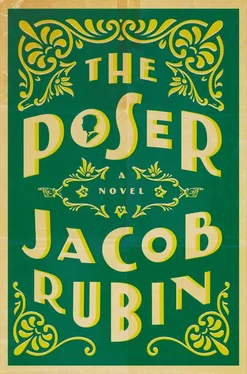Even sure-footed Le Fleuer (who in those drawings appeared as a kind of French horn of a man) buckled a bit under this avalanche of testimony and, in what many local reports took as a sign of his increasing desperation, produced a letter supposedly written by Sandra DeMille to her young nephew in which she wondered, “Where is this young Jesse? I know you’ve made mistakes in the past, but I don’t think it’s right for those mistakes, especially for a young man’s mistakes, to define who he is. Home can be a cruel place. You are, Jesse, and have always been a part of the family.” Le Fleuer carted in his own handwriting expert (an undertaker by the look of the court sketches) who verified the “authenticity” of the letter.
Things were looking up for Mama and Henry Mayfield when, during a nasty spell of rain in mid-March, Jesse Unheim and Morgan Le Fleuer disappeared. Poof . Not at the Home Away from Home Inn. Not at McSteven’s, Connell’s, or any of the county bars. A garbage man, interviewed by the Sea View News , reported seeing four men in overcoats shove Unheim and Le Fleuer into a gray van around four-thirty a.m. one Tuesday. In their absence, Judge Tunder was forced to drop the case, and in the following weeks, word fumbled down the ladder of gossip that Unheim had owed money to the mob out west. By dangling the carrot of his aunt’s estate, he had persuaded his creditors to lend him their lawyer — hence the bizarre competence of Morgan Le Fleuer. But the mob grew impatient with Unheim, lost faith in his chances of winning in court, and removed him. Or so the story went. As before, he was now presumed dead. He had come — hijacked Mama’s life — and disappeared, this pathetic Unheim, who failed even at villainy.
Throughout this ordeal, that trial sketch of Unheim seeped into my imagination. I dreamt I caught that sketch of him in bed with Lucy, enmeshing its squiggly legs with hers. Dreamt I was lost in the bowels of the Communiqué, racing to find the stage, and when I reached the wing and stepped out, there stood that sketch of Unheim in my spotlight, Max next to him, the stage transformed into a courtroom.
Why, in all those months, didn’t I take the five-hour train ride to Sea View and sit by my poor mother’s side? Why did I content myself with writing her, with a leisurely reading of her struggles? There were reasons, though they all seem pale and tired now, like suspects under an interrogator’s lamp.
For one, I’d offered to come. In letter after letter, I’d insisted on coming — even booked a train ticket — but Mama refused: “I miss you more than you know,” she wrote, “but please don’t involve yourself in this mess. This Jesse is a joke, your Mama will be fine. Besides, what would your volunteers do if I stole you away from them?” And I, as always, obeyed, too naïve to know a woman’s insistence in such cases is asserted solely to be overruled.
Even so, I might not have risked leaving for fear of deserting Lucy. In my absence, I was sure, she’d forget who I was or vanish altogether. Like Unheim. Thrown in a van, whisked away. If Lucy was five minutes late for dinner, if I couldn’t find her after a performance, I experienced a light, if well-hidden, panic. She was one of those people who seemed ripe, primed for disappearance.
Plus, I had developed an allergy to Sea View. Or the fear of one. So many smiling angels had descended upon me since I’d escaped — Lucy, the Communiqué, these new handsome manners — all of which would float away from me, I was sure, if I so much as entered Sea View.
Besides, Mama and I had recovered such naked words in our letters it seemed a shame to test them with faces. A few times she and I spoke on the lobby phone, but it was never the same: We were tentative and alien. We hung up, ran to our pens. Our retreating hearts needed those letters, the distance and redemptive fiction of letters. That’s what Jesse Unheim was now: insidious and pathetic, but fictional . He, and the home from which he and I had both fled, transformed into a cartoon. Ah, that Sea View could have remained so, that Mama and I could have lived as pen pals!
• • •
She visited on April 15, two weeks before Max and I were set to leave on a ten-city national tour arranged by Bernard and financed by the famous eccentric and patron of the arts, Marguerite Harris, granddaughter of the late oil baron D. W. T. Harris. Bernard had invited her to a March performance, and Harris, who above all sought out that which was “fresh,” declared me just that. A week later, Max and I met Ms. Harris and Bernard at the Harlequin Club on Forty-third Street. Within fifteen minutes Bernard and Max were phoning her lawyer. It amazed me how quickly the business was settled. Fates sealed with a handshake. As if to confirm a process already under way rather than inaugurate a new one. How long did it take Achilles to return Hector’s body to Priam? For the Trojans to accept the horse?
There was one hitch, however: Giovanni, who delighted Ms. Harris’s appetite for wit— He’s something, isn’t he? Oh, what a strange boy! — insisted that an obscure singer, Lucy Starlight, open for him on these twenty tour dates. Lucy who? Ms. Harris asked. Bernard laid his hand on her elbow, whispering in her ear. “Why then it’s settled,” she said. “A boy needs his toy.”
The day Mama was to arrive, I took a cab to Central Station and waited under its canopy. I wore an old pair of jeans and a suede jacket, an outfit I had owned for years, so as not to betray Mama with some new look. And yet, while waiting, I adopted a posture of cavalier world-weariness: shoulder against a lamppost, legs crossed, hands buried in my jacket pockets, a kind of cowboy’s pose I never would have assumed in Sea View.
In front of me, as I waited, unfolded a tableau of arrival and departure common to any airport, bus terminal, or train station, any depot where travelers stricken with luggage ship off or dizzily return. Families hailed taxis and picked at the luggage-loaded arriver until he carried no bags. Many kissed and patted and hugged, and it was always so clear, just from the tension and grip, whether the hug meant hello or goodbye. A stranger in that scene looked amazingly like my mother, craning her neck in the timid way one searches for someone in public. “Mama!”
She smiled. I couldn’t believe it. It had been just seven months, but Mama was years older. That can happen: in a month, a week, going to the kitchen for a glass of wine, a person can age fifteen years. Maybe the trial had done it. Her hair, shoulder length, was stippled with gray. Her cheeks puffed and pouchy. Yet her eyes were the same. We hugged.
Amazing how easily you forget the only things that matter, I thought, as we motored uptown to the Restless Sailor Inn. Right there, in the vinyl backseat, Mama. “The train ride was just fine! Just fine! Oh, you don’t know how good it is to see you.” She rested her head on my shoulder. I put my arm around her, an action I’d performed for the first time with Lucy. “This trial, Giovanni, beat the life out of me. Jesse Unheim, that little prick — excuse me, Giovanni, you know I don’t like to curse.”
“I had dreams about him. He—”
“Why didn’t you come? Just a couple days you could’ve come. You know how lonely I was?”
“Mama, I—”
She slapped my thigh with zest. “I know, I know. You have your precious Lucy here.” She wagged her finger. “And we’ll get to the bottom of that .”
I knew she would calm down once we had her settled in her room, which in no time we had. She took it all in — the brocaded wallpaper, the plastic flowers, the heavy maroon comforter — with the same head-swirling attention she gave the busy city streets walking to Leaning Tower, the Italian restaurant where Max awaited us. All the while, she stayed close, laying her head on my shoulder, frisking me with those eyes.
Читать дальше












